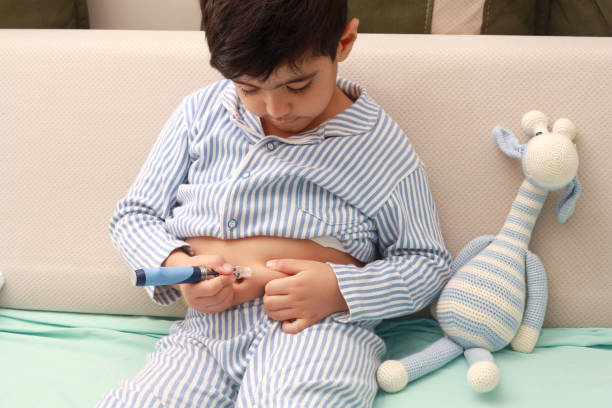
Type 1 diabetes also referred to as insulin-dependent diabetes or juvenile diabetes is a very common disorder in children and adolescents in Kenya and worldwide.
It happens when the body’s immune system mistakenly attacks and destroys its own insulin-producing cells in the pancreas. The exact cause of this autoimmune response is not entirely understood, but it likely involves genetic and environmental factors.
Insulin is a hormone that plays a crucial role in regulating blood sugar (glucose) levels in the body. When insulin producing cells are destroyed, the body cannot produce insulin, leading to elevated blood sugar levels.
Type 1 diabetes often develops in childhood or adolescence, although it can occur at any age. Hence, the term “juvenile diabetes” is sometimes used. It is also referred to insulin dependent because insulin is the mainstay management.
Signs and Symptoms
Sometimes there are no symptoms until the patient is acutely ill with glucose toxicity, other times these symptoms can develop rapidly over a short period.
Signs and symptoms of type 1 diabetes include:
- Increased thirst,
- Frequent urination,
- Unexplained weight loss,
- Fatigue and body weakness
- Blurred vision(not able to see an image clearly)
- Increased hunger
- Irritability and mood changes
- Bedwetting in a child who was not previously wetting the bed
Investigations
The tests that are normally carried out in order to make a right diagnosis are:
- Random blood sugar test of 11.0mmol/l and above is diagnostic. (you can walk to the hospital at any time of the day for this test)
- Fasting blood sugar test of 7.0mmol/l and above is also diagnostic (done after fasting overnight or for 8hrs)
- HbA1C of >6.5% is also diagnostic(a test done to check average sugar levels for the last 3months)
Management:
Type 1 diabetes has no cure, but it can be effectively managed with insulin therapy. In Kenya what we commonly use is mixtard usually administered in the morning and evening. A healthy diet, regular physical activity, and frequent monitoring of blood sugar levels are all crucial in blood sugar control.
At hello Daktari, we are here to assist you make a proper diagnosis and assist with proper management of type 1 diabetes and other health conditions. We also offer advice on dietary and lifestyle changes. We also do offer home based care services within Nairobi and its environs thus we are able to do a proper follow up at the comfort of your home. All you need to do is book an appointment with us on https://hellodaktari.co.ke
Complications:
Poorly controlled Type 1 diabetes can lead to various complications, including heart disease, kidney disease, nerve damage, vision problems, and blood circulation issues. Good blood sugar control is essential to reduce the risk of these complications.
Lifestyle:
People with Type 1 diabetes must carefully plan their meals, count carbohydrates, and adjust their insulin doses accordingly. Regular exercise and maintaining a healthy lifestyle are also crucial.
Blood Sugar Monitoring:
Frequent blood sugar monitoring is essential to ensure that insulin doses are adjusted correctly. This can involve finger stick testing or the use of continuous glucose monitoring systems.
Patient Support:
Managing Type 1 diabetes can be challenging, so individuals often benefit from the support of healthcare providers, diabetes educators, and support groups to learn about self-care and coping strategies.
It’s important for individuals with Type 1 diabetes to work closely with their healthcare team to develop a personalized management plan and to stay vigilant in monitoring and controlling their blood sugar levels to minimize the risk of complications. We are here for you.
Click on https://hellodaktari.co.ke and book an appointment with us.
